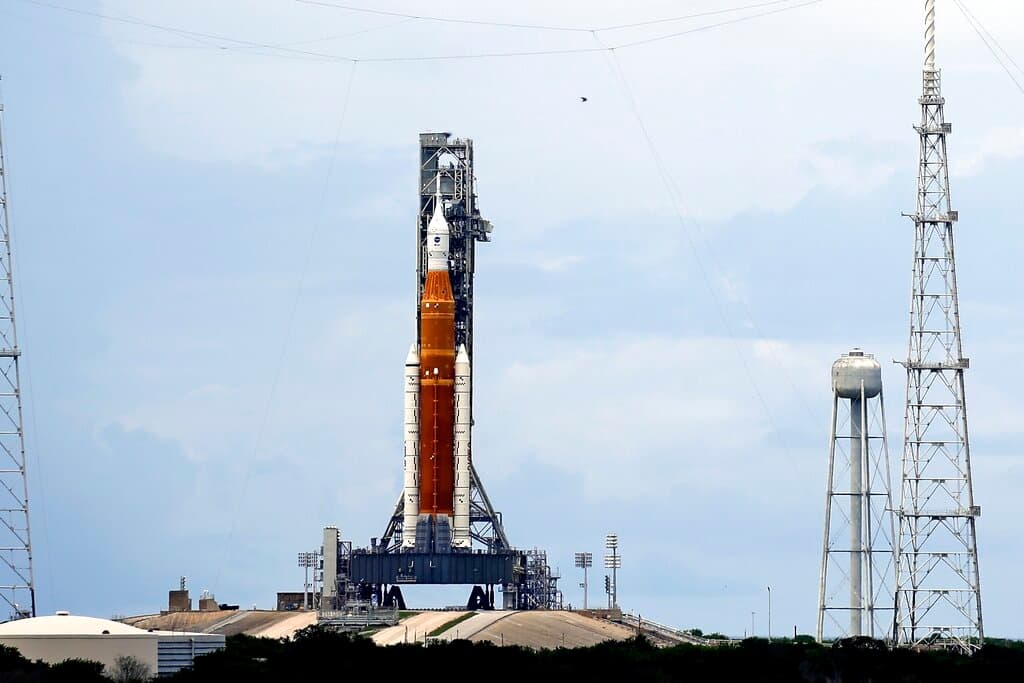On the 60th Anniversary of JFK’s Moon Shot, NASA Stumbles on New Rocket
NASA chose a mission that it is not uniquely positioned to do. Government resources are limited, and NASA should deploy them only where actions by private actors are unlikely to be sufficient to get the job done.

This week, the sixtieth anniversary of President Kennedy’s decision to go to the moon, the rocket NASA hopes will take us back to the moon, the Artemis 1, idles on a Florida launchpad, plagued by technical problems.
Whether NASA’s newest and largest-ever rocket eventually flies, it will be a failure.
This is not just because private companies have built cheaper and better rockets. After all, for a lot less, NASA could simply buy its astronauts a ride on the Starship being developed by SpaceX.
The problem is that NASA chose a mission that it is not uniquely positioned to do.
Government resources are limited, and NASA should deploy them only where actions by private actors are unlikely to be sufficient to get the job done.
Another upcoming NASA mission — the Double Asteroid Redirection Test (DART) — is an example of a good government project.
DART is a proof of concept for the eventual deflection of a planet-killing asteroid. This is a problem the government is best positioned to solve.
Government is nothing more than a mechanism for collective action. If people want to come together in large numbers to solve problems — whether it is to fight communists or Covid — the government is one way.
But it isn’t the only way.
Corporations and non-profit organizations are other ways for large numbers of people to cooperate to achieve goals.
Businesses achieve social goals through voluntary transactions and are disciplined by markets.
Government action is based on coercion, enforced through its monopoly on violence, and subject only to crude democratic accountability.
This is not to say businesses do not act selfishly. All organizations do.
It is only to suggest that when they do, the forces that constrain wrongdoing are more powerful than those that constrain government.
For this reason, it makes sense to limit government action to those things that the free market cannot or will not deliver.
One of the most important roles of government is to improve the human condition by creating “public goods.”
A public good is something that benefits us all, but that the market will not produce because it is not profitable. Providing defense to the nation, highways, clean water, and public parks are examples.
People cannot be excluded from the protection of the military, and this means that if asked to pay for it, everyone would free ride instead.
This brings us back to NASA. The DART program is a classic public good. No business is incentivized to solve this problem.
The cost-benefit calculation for investing in a safety net against a killer asteroid is clearly positive for humanity.
But the problem is too remote in time and probability to get anyone to pay for this. The people saved from potential annihilation cannot be sent a bill.
For this critical public good, the government is the developer of last resort.
Artemis is a different story. In the aughts, government decided to build a rocket to return to the moon, something that sounds like a bad sequel.
It would have been smarter to accelerate investments in tech to transform the economics and access to space.
SpaceX is relentlessly pushing down launch costs, while NASA’s efforts to salvage the old paradigm are ballooning above the $25 billion estimate.
But the bigger problem is the decision for NASA to send astronauts to the moon in the first place.
There was a time when only the government could do such a thing. That said, even under Kennedy, NASA mobilized numerous private businesses to help it get there and back.
But today, the government need not be involved at all. SpaceX and other private companies have ambitious plans to explore space because they can make a profit doing so.
Having the government compete with them merely drains scarce public resources from projects that we actually need the government to do.
In addition to DART, worthwhile projects include the hugely successful Webb Space Telescope. Unlocking the mysteries of the Big Bang is not a direct money maker, but it is worthwhile nevertheless.
Remember, the money saved by focusing on pure public goods need not be spent in space. Billions wasted trying to beat SpaceX to the moon could be spent on education or raising the life expectancy of Americans.
In general, the government should do something only if it is the most efficient provider of that thing. Let’s put that moon money to better use.

